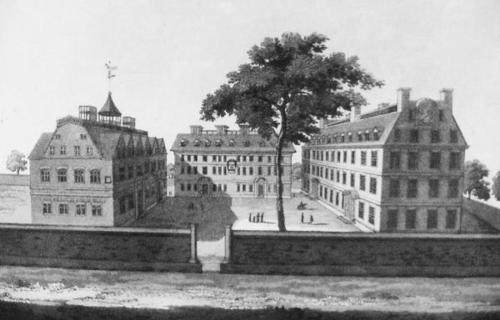John Quincy Adams arrived at Harvard in May, 1786, a 19-year-old junior. He had spent much of the previous decade living the terribly mondain life of an American expat in Europe. Now, for the first time, he lived among young men his own age. He loved it. Adams studied hard, learned to play the flute, organized dances and developed dear friendships. We know this because he kept a meticulous account in his journal.

Harvard in Adams’ day
Adams’ journal serves as one of the great sources of knowledge of Harvard life in the 1780s, not to mention of the Class of 1787. In his senior year Adams decided to write short sketches of each of his 46 classmates, in alphabetical order. He carefully listed the birthplace and date of each man before delineating his temperament and achievements, or lack thereof. In the years before, he had amused himself by writing “characters,” most of them mocking, of the girls he met. Now he may have felt that he was writing for posterity, for Adams expected some of his classmates to rise to the leading ranks of the nation.
We can recognize something almost achingly familiar in each of Adams’ pen portraits, even the most Hogarthian of them. Asa Johnson, at 28 the oldest member of the class, had ambition, but not talent. “Unfortunately,” Adams wrote, “he has hit upon a method which will not succeed: he has determined never to be of the same opinion as any other person, and to bid the world defiance.” Johnson treated the existence of God “as an absurd chimera, which little minds only can conceive. …If you pretend to reason with him, he will not argue but by cavilling. … He carries his singularity so far, that in eating a piece of bread and butter, he holds the butter down, so that it may come upon the tongue.” Adams saw through the absurd posturing to Johnson’s desperation: He was so poor that he had cut off his boot tops in order to fashion the uppers of a pair of shoes, and turned the folds of his shirt into a waistcoat.
The vapid Joseph Jackson: “His face is as perfect a blank as his mind. …He is extremely dull of apprehension, and possesses no other talent than that of pouring forth in profusion the language of Billingsgate.”
Solomon Vose, an avowed enemy: “As vain, envious, malicious, noisy, stupid a fellow as ever disgraced God’s creation. …possessing all the scurrility of a cynic with all the baseness of a coward. …Incapable of receiving pleasure, butt from the pain of others.”
William Lovejoy Abbott, a deadpan wit: “He appears fond of being thought a dry humorous fellow, and has acquired a great command of his Countenance.”
John Sever: “His genius is very good, but he is destitute of all moral principles, and he has ever been remarkable for dissipation and disregard of the laws of the University.”
Adams was as often generous as he was harsh. Of Benjamin Beale, he wrote, “The Government [of Harvard] has so repeatedly taken note of him at exhibitions, that it has given offence to many young men of the university, and they affect to despise his abilities, and deny his scholarship. …he displays no vanity, either of his person, which is elegant, or of his genius, which has been flattered by distinctions, and this I think is a mark of sense.”
And he could be dispassionate about those closest to him. Of his best friend, James Bridge, he recorded, “His genius is metaphysical, rather than rhetorical; in reasoning with him, we are rather convinced by the force of his argument, than seduced by the brilliance of his imagination.” Bridge was ambitious, charming, benevolent. “I think very probably that he will one day be eminent in the Political line.”
It was not Bridge, of course, but Adams who would become eminent in the political line. Adams was the only member of the Class of 1787 whose name means anything to us today. The administration honored Adams’ intellectual gifts by choosing him to deliver one of the two English orations at Commencement. Yet Adams was not the class star. He considered several of his friends superior to him in scholarship, and his classmates did not choose him as president or vice-president.
Like generations of graduates after him, Adams found much at Harvard to curb his vanity. His time there, he reflected, “has been productive of very good effects, particularly in reducing my opinion of myself.” And like many others after him, he could hardly bear to think of life after Harvard. “Too soon,” he wrote, “I shall be obliged to enter anew upon the state of general society, one which I have already met with disgust, and which with satisfaction I quitted.”
Adams’ premonitions were all too accurate: Never again would he be as happy as he had been during his time at Harvard.